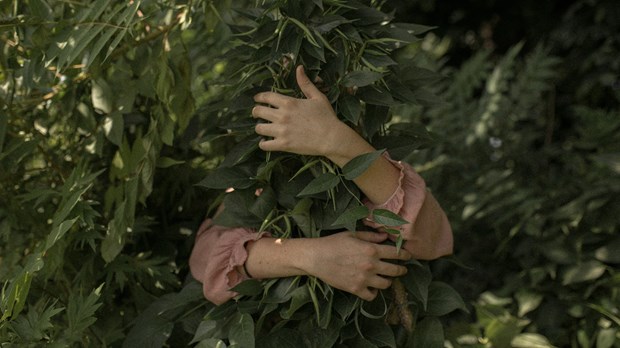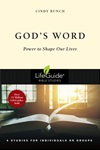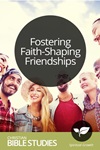It all began with two simple questions.
A few years back, my husband was a well-respected physician at the top of his career—director of emergency services and chief of medical staff. He loved taking care of patients, and I loved caring for our family. We lived with our children, Clark and Emma, in a picture-perfect town in a three-story New England house, complete with library, guest suite, and four bathrooms. Our kids took sailing lessons in the summer and skied in the winter. We ate lobster fresh from the wharf. We were enjoying the good life and living out the American dream.
But something was missing. We had all the nice things that were supposed to make us happy, yet at the core we still felt hollow.
Around this time, we went on a family vacation to a barrier island off the coast of Florida. The island is idyllic—no cars, no roads, no stores—just sun and surf and beautiful sunsets. After playing in the ocean all day and running around trying to catch geckos, the kids went to bed early, exhausted. Adult time, at last! Matthew and I relaxed on the upstairs deck, watching the palm trees waving in a cool breeze and enjoying the silence of the stars.
We stayed like that, just sitting in the tropical moonlight, for a long time. I couldn't help but compare the peacefulness of the night air with the busyness of our lives back home. So rarely did we have time to stop and think, to discuss the big questions of life. Our conversation rambled from art and music, to books we were reading, to the state of the world.
And then I asked two questions that would change our lives forever.
"What do you think is the biggest problem facing the world today?"
I could just about see the wheels whirling in Matthew's head: Hunger? Poverty? War? AIDS? There was no shortage of potential answers.
After a few minutes, Matthew offered a reply that I was not expecting: "The world is dying."
He explained his reasoning. "There are no chestnuts left on Chestnut Lane, no elms on Elm Street, no caribou in Caribou, Maine. The oceans are just about fished out, and the songbirds are disappearing. Rainforests the size of North Carolina are being cut down each year—and more than 20,000 species go extinct annually."
Matthew took a long sip from his glass, and then sighed. "For the first time in history, the amount of living matter on earth is actually decreasing—there's no good ending to this story. If we don't have a healthy planet to sustain humanity, none of the other problems will matter."
It didn't take much to convince me that Matthew was right—our planet is indeed dying. I could see the changes in my own lifetime. As a child, I remember frequently stopping to help turtles cross the road—and seeing frogs, fireflies, honeybees, and butterflies everywhere. Seemingly endless flocks of birds would fly overhead every spring and fall. But in just a few decades, nearly all of this wildlife had disappeared. The meadow behind my childhood house had been replaced with ChemLawn green grass and cookie-cutter McMansions. When I approached the nearest major city, I saw a dome of smog covering its inhabitants. Without clean air, clean water, and healthy soil our children would face a turbulent future, with people struggling for increasingly scarce resources.
Making Changes
The more we talked about the demise of the planet, the more depressing it all felt. The problems seemed so overwhelming. But Matthew is a big-picture thinker, a problem-solver, a man of action.
That's when I asked the second, more difficult, question: "If the planet is dying, what are we going to do about it?"
My husband did not have a ready answer. But when we got back from vacation, he did not stop thinking about the challenge. A couple of months later, he finally did get back to me with an answer I wasn't prepared to hear:
"I'll quit my job," he said, "and put all my energy toward saving the planet."
"Are you sure we need to do that much?" I replied.
I had always thought of myself as a good environmentalist. I understood why recycling was important. And picking up litter. I was even okay being the only mom on our block without a family van, making do with a more fuel-efficient sedan. But giving up a career that my husband clearly loved, as well as the prestige, steady income, and security that came along with it, to "save the planet"?
The thought terrified me. My stomach turned inside out just thinking about what we might lose—our beautiful home, our harbor-side neighborhood, our vacations, not to mention health benefits and a retirement plan. It wasn't like Matthew had a meaningless job—he was employed by a nonprofit hospital, healing the sick and taking care of the poor. And he was extremely good at his work: Matthew had a gift for diagnosis and a talent for putting his patients at ease in even the most trying circumstances.
The selfish part of me began to whine: What about the three years of undergraduate school, four years of medical school, and three years of residency we had gone through together? Wouldn't he be wasting all that training? And then there were practical concerns: The kids were approaching their teen years. College was just around the corner. How would we possibly save enough money to pay for their education if our income dropped suddenly to zero? How, for that matter, would we put food on the table?
Each of my arguments sounded logical on its own. In the material world, my husband's sudden career change made no sense. Walking in faith may sound good in theory—when it happens to other people and everything turns out okay in the end—but I was terrified to take even the first step. What followed was a tense time, full of anxiety, fear of change, and conflicting desires.
People ask us if we had any arguments. Of course we did! I'd be lying if I said that there were no raised voices or sleepless nights. But gradually I came, if not to peace, at least to acceptance of the new direction our life would take.
Saving the Planet Saved Us
The transition—as much emotional and spiritual as physical—took a couple of years. One of the very first things we did was to take a measure of our ecological footprint. We had always thought of ourselves as environmentally aware—using cloth diapers, recycling, never driving a car with more than a four-cylinder engine. But when we actually calculated our total use of resources, we found ourselves exactly average for Americans: not bad for a physician's family because usually the more income people have, the more resources they consume. Yet, we were clearly using more than our fair share on a global scale: six times more energy than our neighbors around the world!
Providentially, as we embarked on our environmental journey, we also began a faith journey. It seemed, at least to us, that the two were inseparable. Corning from two different faith backgrounds, Matthew and I began reading a range of sacred texts including Hindu, Buddhist, and Hebrew. We listened to the Ramayana on tape together, read parts of the Book of Mormon, and even worked through the beginning of the Koran, but still we did not seem to find any satisfactory answers.
One slow night in the hospital, Matthew picked up an orange Gideon's Bible in the waiting room. He read through one of the Gospels. A light came on. Here were the answers we had been seeking.
Matthew brought the Bible home. One by one, each of us became believers—first Matthew, then Clark, then me, and finally Emma. And that changed everything. Suddenly, the whole family was working off the same page. We had a clear purpose: to love God with all our heart, mind, soul, and strength, and to love our neighbors as ourselves. One way that we could show our love for the Creator, and for our global neighbors, was to start taking better care of the planet.
To learn what the Bible had to say about earth stewardship, Matthew read through the entire Old and New Testaments, underlining in orange pencil everything that had to do with nature, creation, and how we are to instructed to care for the earth. We found that Matthew 7:3-5 seemed to speak directly to our family: "And why worry about a speck in your friend's eye when you have a log in your own? How can you think of saying to your friend, 'Let me help you get rid of that speck in your eye,' when you can't see past the log in your own eye? Hypocrite! First get rid of the log in your own eye; then you will see well enough to deal with the speck in your friend's eye."
We took Jesus' advice and began cleaning up our own act before worrying about cleaning up the rest of the world. Over the next couple of years, we downsized our lifestyle, giving away half of our possessions and moving to a house the size of our old garage. Contrary to my earlier fears, we found that the more we "gave up" in material things, the more we gained in family unity, purpose, and joy. Eventually, through many small changes, we reduced our electricity usage and trash production by 90 percent and our fossil fuel usage by 66 percent.
Sharing Our Experience
After we had our own house in order, we felt called to share our journey. Matthew wrote a book called Serve God, Save the Planet: A Christian Call to Action. Using stories from our family's life, he relayed why we made these changes and inspired others to do the same.
People liked the book—a lot. It's an easy book to read, but hard to ignore. Letters poured in from readers who felt called to change but didn't know where to start. Invitations to speak, preach, and lead workshops carne from Washington, D.C. to Washington State, from every denomination and faith, from churches with ten members to tens of thousands. People were inspired to change; now they wanted to know how.
We reflected on what worked, what didn't, and what we learned in the process. Some steps came easily; others required a new way of thinking or a change of habits. There is no one-size-fits-all plan; each family must decide which changes work best for them, and then keep doing a little bit better every year.
What if someone in your household is not on board? Our daughter Emma, reluctant at first, ended up writing a book for teens called It's Easy Being Green and becoming a leader of the next generation's Christian environmental movement.
Regardless of where you and your family members are on the journey, you can use practical advice on everything from household cleaners, gardening, and fast food, to tips for Christmas shopping, giving away money, and finding quiet time with God. This is a personal journey of hope. If someone like me can do it, I know you can too!
Years ago, back on that island in Florida, two questions—prompted by God—launched our family on this journey. Today, when making any choice, purchase, or decision, we ask ourselves two new questions: Does this bring me closer to God? And, does this help me love my neighbor?
The answers always lead us down the right path.
Dear heavenly Father, Creator, and Sustainer, please open my heart to the beauty of your creation. Teach me to value your sustaining gifts and to steward them wisely. I beseech you, gracious and loving God of the universe, to create a thirst in my heart for change: Give me a thankful heart, and free me from my wasteful habits. Teach me to rely on your strength alone, for I know that real and lasting transformation can only come through you.
This article was adapted from the introduction of Go Green, Save Green, by Nancy Sleeth, (Tyndale, 2009). Used by permission.
Copyright © 2013 by Christianity Today/ChristianBibleStudies.com. Click here for reprint information.













